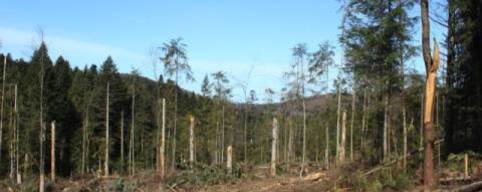

A recent investigation by the Environmental Investigation Agency (EIA) has uncovered widespread illegal logging activities within Colombia's timber export industry. This revelation has significant implications not only for the environment but also for the social fabric and economic frameworks both locally and internationally. With staggering data that underscores the scale of the issue, this report sheds light on the urgent need for action and reform.
The EIA's investigation reveals that approximately 94% of Colombia's timber exports, particularly timber decking and flooring, destined for markets in the United States, Canada, and the European Union, lack necessary legal certification. This statistic is alarming as it points to widespread illegal logging practices that are overriding legal safeguard measures. These uncertified exports undermine international regulations designed to protect against illegal timber trade, such as the Lacey Act in the US and the EU's Timber and Deforestation Regulations.
This illegal influx is not just a compliance issue but poses serious threats to the integrity of these markets. The sheer volume of uncertified timber challenges the effectiveness and enforcement of these legal frameworks. As a result, there is growing pressure on international governments and agencies to bolster their regulatory oversight and enforcement actions against the ongoing illegitimacy in the timber trade.
The pervasive reach of these uncertified timber products into major international markets also raises ethical concerns and calls for heightened scrutiny. Consumers and businesses alike risk being unwitting accomplices to illicit activities, which undermines efforts to foster sustainable and ethical sourcing practices. It becomes imperative, therefore, to find mechanisms that effectively verify the legality of timber imports and hold offenders accountable.
The connection between illegal timber trade and organized crime in Colombia adds another layer of complexity to the issue. The EIA's report suggests that powerful criminal networks are exploiting the timber industry to further their illegal enterprises. This connection not only perpetuates illegal logging but also poses broader implications for national security and international crime syndicates.
In parallel, there is a human cost to these operations. The report highlights the dire situation facing Afro-Colombian communities in the Pacific region who are often coerced into participating in illegal logging due to economic and social pressures. These communities face exploitative working conditions, deepening their socio-economic marginalization and perpetuating cycles of poverty and inequality.
This exploitation underscores the urgent need for policies and support systems that protect vulnerable communities and provide them with sustainable and lawful means of livelihood. Strengthening community resilience against predatory practices could serve as a linchpin in curtailing illegal logging by addressing one of its contributing factors at the grassroots level.
Moreover, international collaboration becomes crucial in mitigating these concerns. By fostering partnerships that promote sustainable logging practices and strengthening the capacities of developing nations to enforce legal compliance, a more ethical and equitable timber trade can be promoted.
The EIA's findings serve as a stark reminder of the multifaceted challenges posed by illegal timber activities. They emphasize the need for comprehensive strategies that integrate legal oversight, community empowerment, and international cooperation. Addressing these issues is not only a matter of ecological necessity but a moral imperative towards achieving a fairer and more sustainable global trade system.



